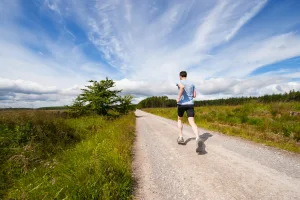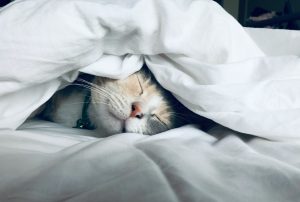Sleep
To Morning Exercise or Not to Morning Exercise

Patients (and students) can be good teachers, and one recently reminded me of an important premise, as she reported feeling much better since beginning to exercise in the morning upon waking, before breakfast, before doing anything else. For her, this made sense. For approximately the other half of the population it would not.
Sunrise in Chinese medicine is Shao Yang time, the time of day that corresponds, logically, with the body’s pivot, that is the system whose responsibility it is to use cortisol to bring vital substances, such as immunological or hormonal, upwards in the body. For those of us whose cortisol spikes too quickly or too early, exercise is one way to temper this surge. Interestingly, healthy food is another way. While physical movement can clear some of the inflammatory heat associated with morning cortisol, a proper breakfast of protein, unrefined sugars, and/or healthy fats can also act as an anchor to prevent it from spiking so much in the first place. For the types of people more prone to insomnia, hyperactivity, and fast metabolisms, it seems a moderate morning workout shortly followed by breakfast might be ideal.
For the opposite body type, prone to hypersomnia, chronic fatigue, and/or weight gain, a better time to exercise might be the time of day associated with the most “yang qi,” or warmth, closer to 12 noon, as these people tend to be more lacking in cortisol, as well as other excitatory chemicals, and therefore will benefit more by moving in accord with the environmental nature around them.
For those of us with small children at home, who cannot exercise upon waking, or those with jobs that preclude us from exercising just before lunch, I recommend doing what you can. Everyone is busy, but if you can find 15-30 minutes/day to get in your preferred form of movement, almost every scientific study on the subject since the beginning of scientific studies corroborate the benefit.
Restoring Breath: Acupuncture for Treating Sleep Apnea

According to the National Council on Aging, approximately 39 million U.S. adults suffer from obstructive sleep apnea. And for those with severe cases, it can lead to heart, kidney, and metabolic health complications. Despite trying the common solution of a CPAP machine and recommended lifestyle changes, many find their breathing issues persist, impacting not only their sleep but their overall well-being. continue reading
Breathing Exercises for Insomnia
 Everyone has their achilles’ heel—even the most successful or effective clinicians—and one of mine, as I’ve discussed before, is insomnia. On the bright side, mine is not constitutional—I never struggled with sleep as a child or adolescent. Unfortunately, this means by around 30 years old I had created it myself, whether through stress or unhealthy lifestyle, surely with a dash of genetic predisposition. My family tends to be more manic and wiry than sluggish or lethargic, the former of which lends itself to an overactive “yang,” or sympathetic nervous system.
Everyone has their achilles’ heel—even the most successful or effective clinicians—and one of mine, as I’ve discussed before, is insomnia. On the bright side, mine is not constitutional—I never struggled with sleep as a child or adolescent. Unfortunately, this means by around 30 years old I had created it myself, whether through stress or unhealthy lifestyle, surely with a dash of genetic predisposition. My family tends to be more manic and wiry than sluggish or lethargic, the former of which lends itself to an overactive “yang,” or sympathetic nervous system.
There are many disease patterns that might explain insomnia, but the top 3 are as follows:
- Blood deficiency: These people tend to be interrupted and/or have trouble staying asleep more than they do falling asleep. If they wake up and feel hot this might be the “blood deficient yang ming syndrome,” which requires heat-clearing in addition to blood nourishing.
- Ben Tun Syndrome: These people tend to have more trouble falling asleep, are subject to ruminating thoughts, anxiety, and heart palpitations. If there are no ruminating thoughts, and they’re just inexplicably lying there awake, good news: This might be the aforementioned “Yang Ming heat” stirring, more than sort of any anxiety condition.
- Food stagnation: These often wake in the middle of the night with stomach discomfort, reflux, or phlegm in the sinuses. They tend to benefit greatly from intermittent fasting, where they either skip dinner or eat it very early, around 5 or 6pm. They
In the past Chinese Medicine has intermittently helped with my own sleep issues, although there have been times where neither me nor my own herbalist/teacher have been able to crack the code. Much like a lawyer who represents themselves in court, it is challenging to write your own formula or treat one’s self. With acupuncture, beyond treating the overall pattern, I like to use points on the head, around the prefrontal cortex and pineal gland to modulate the neurological component of the issue.
I’ve used products like melatonin or Doc Parsley also with intermittent success, but obviously one should not be reliant on such supplements in perpetuity, especially since it is impossible to prescribe them holistically, tailored to the patient. They are symptom-managers, admittedly helpful during crises and less aggressive than pharmaceuticals, but still not ideal.
Beyond internal medicine, the best tools to maximize sleep are the obvious sleep hygiene and the breath. Melatonin secretion begins at 9pm and peaks at 10, so this is the best time to get in bed. If you can’t get to bed by 10, the earlier the better. Of course, sleep in a dark, relatively cool room, and spend the last two hours before bed with as little electronic (and digestive) stimulation as possible. If your sleep is interrupted use your breath to try and relax. This works for me about 80% of the time:
The 4-7-8 breath is one I learned from my wife, Dr. Jillian Cohen, and she learned it from Dr. Weill’s fellowship for Integrative Medicine.
Whenever that doesn’t work for me, I move on to this Kundalini yogic breath, defined by its silent mantra, which simply means saying it silently to yourself.
Finally, if that doesn’t work, I bring out the heavy artillery, which is to say God. You don’t have to be religious to believe in a higher power, and I imagine anyone who’s laid awake in bed struggling for several hours is willing to invoke whatever might be available to resolve the crisis. Using another silent mantra and breathing only through the nose I inhale: “I am God,” then exhale: “God is love.” This works almost all of the time, I think calming my central nervous system with the reassurance that no matter how poorly I sleep, no matter how difficult tomorrow is, I am ultimately connected to the source and none of this shit really matters. Hope that helps!
Three Reasons to Add Deep Breathing to Your Daily Routine

You might think breathing is second nature, right? You’re doing it right now as you are reading this. But did you know that there are different kinds of breathing and that what is called deep breathing can have important health benefits? Read on to learn just three of the most important reasons you should add deep breathing to your daily routine. continue reading
Sleep Supplements (for Temporary Use)

To non-insomniacs, insomnia is as foreign a concept as indigestion is to those of us with iron stomachs. The latter have experienced nausea maybe a few times in life, they’ve had food poisoning or diarrhea, so they know the feeling—but they have no idea what it’s like to be in a perpetual state of gastrointestinal vulnerability. To have to always be aware of what they’re eating or have a lesser capacity for the holiday indulgences that others seem to be able to “stomach” relatively easily.
Conversely, most non-insomniacs have experienced sleeplessness on at least one occasion. Having caffeine too late in the day, an exorbitant amount of life stressors on one’s mind, or just a random night of anxiety, feeling inexplicably wired in anticipation of a potentially exhausting day to come. However, they don’t know what it’s like for this to make up the majority of one’s nights, for it to become a vicious cycle of neuroses around sleep hygiene and schedule decisions, nor the cumulative effect of chronic insomnia versus a bad night here and there.
Insomnia is considered one of the most difficult pathologies to address, not just in Chinese Medicine, but in western medicine and most medical paradigms. There are many moving etiological parts, from the brain’s pineal gland and vagus nerve to adrenal hormones, parasympathetic function, and of course the “food stagnation” pattern. Anyone ever eat a huge meal late at night and sleep poorly? This might be a pile of pizza clogging up the vagus nerve’s pathway for sleep neurotransmitters to smoothly travel along.
While it is important to remain vigilant in uncovering the root cause and holistic pattern of any disease, symptom management, in my opinion, can be equally important in the interim. Diet, sleep, and exercise are a trifecta agreed upon across all medical paradigms, as the holy grail to avoiding disease, so when one is compromised it should be addressed with urgency.
If breathing exercises work for you it generally indicates a less severe root pattern, also offering an opportunity to hone your meditation skills. I recommend either the 478 Breath or this silent kundalini yoga mantra.
If yours is more of a “blood deficient yang ming” kind of insomnia (think waking in the middle of the night or early in the morning and feeling wide awake, but somehow still exhausted), breathing alone will likely not be enough. This is a difficult pattern to treat, albeit do-able, but during the trial-and-error healing process I’d recommend any of the following supplements:
DOC PARSLEY is a melatonin blend, not advisable to use long-term but according to my most respected teachers it is relatively helpful and harmless off and on for brief interims.
SHIZANDRA DREAMS combines western and eastern herbs, the former of which includes valerian root. Again, we do not believe any medications should be taken in perpetuity, but this is okay to use briefly while getting your life and/or brain back to normal operating mode.
Finally, and I have mentors who’d smack me for writing this, but SUAN ZAO REN TANG is a generic formula that has personally helped me in the past. It includes poria mushroom, licorice, chuanxiong root, anemarrhenae root, and zizyphi seed. Its imperfections lie in the fact that zizyphi seed is nourishing, hence sticky, so if the patient bears a great deal of systemic damp heat it may aggravate this. Also, anemarrhenae is very cooling, so if the patient is already cold they might become colder. Western medicine has the luxury of not having to consider such factors. “Some people experience side effects. Some don’t (shoulder shrug).”
Please consult me if you’d like to order any of these or once you begin taking them, so we can execute intelligently, in spite of the reductionist medical recommendations I’ve just shared.


